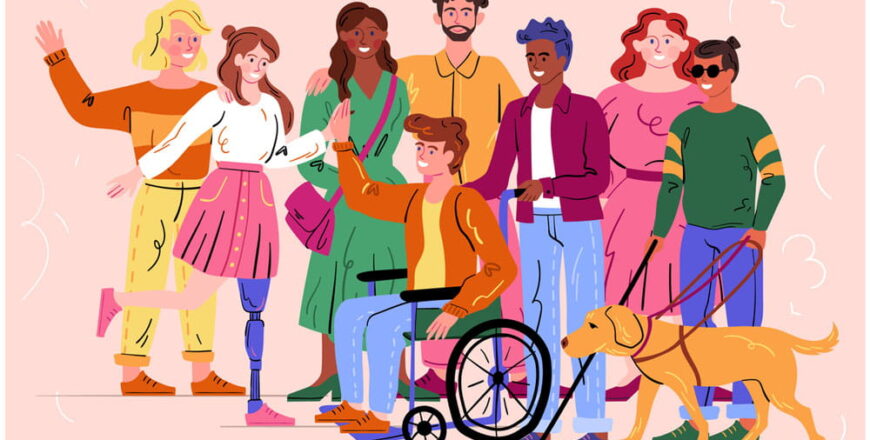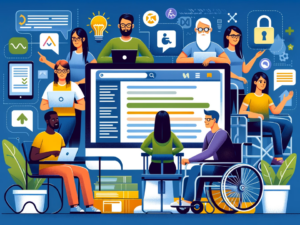2. Types of Disabilities / Specific Access Requirements
- Description
- Curriculum
- FAQ
- Notice
 |
 |
SPONSORS: VIAMOON CONSULTANCY & CAREADISE
Where Miracles Happen
Objectives and Contents of the Module
This module aims to provide participants with a comprehensive understanding of the diverse needs and requirements of travelers with disabilities, enabling them to provide inclusive and accessible tourism experiences.
Learning Objectives:
-
Understand the diverse needs and preferences of travelers with disabilities:
- Define and describe different types of disabilities, including physical, sensory, cognitive, and intellectual disabilities.
- Explore the impact of various disabilities on travel experiences.
- Recognize and understand the unique needs and preferences of travelers with different types of disabilities.
-
Identify and analyze specific access requirements:
- Recognize the specific access needs of travelers with different types of disabilities across various travel sectors (accommodation, transportation, attractions, etc.).
- Analyze how different disabilities impact travel needs and preferences.
- Identify potential barriers to accessibility at different stages of the travel journey.
-
Develop inclusive service solutions:
- Explore strategies for adapting existing products and services to meet the diverse needs of travelers with disabilities.
- Design inclusive service solutions that address the specific access requirements of different customer groups.
- Develop strategies for providing customized service experiences for individual travelers.
-
Improve accessibility within the tourism sector:
- Analyze the current state of accessibility within the tourism industry.
- Identify and address key challenges and barriers to accessibility.
- Develop strategies for improving accessibility across the tourism value chain.
Theoretical-Technical Skills:
-
Knowledge of different types of disabilities:
- Characteristics of physical disabilities (e.g., mobility impairments, amputations).
- Characteristics of sensory disabilities (e.g., visual impairments, hearing loss).
- Characteristics of cognitive disabilities (e.g., intellectual disabilities, dementia).
- Characteristics of neurodivergent conditions (e.g., autism spectrum disorder, ADHD).
-
Understanding of access needs:
- Identifying the specific access needs of travelers with different types of disabilities.
- Recognizing the importance of accessible information and communication.
- Understanding the need for assistive technologies and support services.
-
Designing accessible services:
- Applying principles of universal design and inclusive design.
- Adapting existing services to meet the needs of diverse travelers.
- Creating accessible environments and experiences.
-
Identifying and addressing barriers to accessibility:
- Recognizing attitudinal barriers and discrimination.
- Identifying physical barriers in the built environment.
- Analyzing communication barriers and information accessibility.
- Developing strategies to overcome accessibility barriers.
-
1IntroductionRead More
- Welcoming and Introduction of new module
- Recap previous course module on: Introduction to Accessible Health & Wellness Tourism
- What to expect in this course module
-
22. LIVE LEARNING WITH PROFESSOR (TBA)2 Hours
Will go over -- From START to FINISH:
2. Types of Disabilities / Specific Access Requirements
To understand where accessibility issues can arise, it is helpful to have a basic understanding of a range of disabilities
and the related barriers found in online and offline content. These include people who are blind, people with low vision, people who are deaf or hard of hearing, people with mobility-related disabilities, and people with learning or cognitive disabilities.Send email to: elasten@gmail.com (Subject: wants PPT Module 1) if you want Presentation before Live Meeting with professor Lasten! WhatsApp: +297 563 5242 is another option! Thanks.
-
3ADA & 504 Overview3:43 Minutes
-
4Customer-Centric Perspective for AllRead More
Point of view: Services for customers with disabilities / specific access requirements
-
52.0 Understanding Disabilities & Access Requirements22:42 Minutes
-
6OVERVIEWPPT File (formatted in PDF)
Introduction PDF file
-
7Quiz 2.12 questions
-
8I.C.F. ElaborarionRead More
The ICF (International Classification of Functioning, Disability and Health)
-
Context of ICF:
- Developed by the World Health Organization (WHO).
- Provides a standardized language and a conceptual framework for describing and understanding human functioning and disability.
- Acknowledges that disability is a complex phenomenon resulting from the interaction between health conditions, personal factors, and environmental factors.
- Shifts away from a solely medical model of disability towards a biopsychosocial approach.
-
Individual Application of ICF:
- Can be used to assess individual functioning and disability in various settings (healthcare, rehabilitation, social services).
- Helps to identify individual needs and strengths.
- Guides the development of individualized support plans and interventions.
- Facilitates communication and collaboration among healthcare professionals and other stakeholders.
-
ICF Usability:
- Provides a common language and framework for professionals across different disciplines.
- Enables data collection and analysis for research and policy development.
- Supports the development of inclusive and accessible services and environments.
- Promotes a more holistic and person-centered approach to disability.
-
-
9Physical DisabilitiesVideo lesson
-
102.1 The ICF Framework: Understanding Disability Holistically27:52 Minutes
-
11Share The ICF Framework: Understanding Disability HolisticallyPPT File (formatted in PDF)
PDF File
-
12Quiz 2.22 questions
-
13General InformationRead More
-
Physical Disabilities:
-
Mobility impairments:
- Wheelchair users
- People with limited mobility (e.g., difficulty walking, climbing stairs)
- Amputees
-
Musculoskeletal conditions: Arthritis, multiple sclerosis, muscular dystrophy
-
Neurological conditions: Cerebral palsy, spinal cord injuries, Parkinson's disease
-
Access Requirements:
- Ramps, elevators, accessible restrooms
- Wide doorways and hallways
- Adapted transportation (wheelchair-accessible vehicles)
- Assistive devices (e.g., wheelchairs, scooters, walkers)
- Adapted accommodations (e.g., roll-in showers, grab bars)
-
-
Sensory Disabilities:
-
Visual impairments: Blindness, low vision, color blindness
-
Hearing impairments: Deafness, hard of hearing
-
Access Requirements:
- Visual aids (e.g., Braille signage, large print materials, audio descriptions)
- Assistive listening devices (e.g., hearing aids, FM systems)
- Sign language interpreters
- Clear and concise verbal and written communication
- Adequate lighting and contrast
-
-
Cognitive Disabilities:
-
Intellectual disabilities
-
Learning disabilities (e.g., dyslexia, dysgraphia)
-
Autism spectrum disorder
-
Dementia
-
Access Requirements:
- Clear and simple instructions and signage
- Easy-to-understand language and communication
- Reduced sensory overload (e.g., quiet areas, low lighting)
- Assistive technologies (e.g., screen readers, text-to-speech software)
- Supportive and patient staff
-
-
Neurological Conditions:
-
Parkinson's disease, epilepsy, multiple sclerosis
-
Access Requirements:
- Rest areas and quiet zones for those who may experience fatigue or seizures.
- Assistance with navigation and orientation.
- Consideration for potential sensory sensitivities (e.g., noise, light, crowds).
-
-
Other Disabilities:
-
Chronic illnesses (e.g., diabetes, heart disease)
-
Temporary disabilities (e.g., broken limbs, pregnancy)
-
Access Requirements:
- Accessibility features that cater to a wide range of needs.
- Flexible policies and options to accommodate individual needs.
- Staff trained to recognize and respond to diverse needs.
-
-
-
14Understanding Disability Access RequirementsPPT File (formatted in PDF)
-
15Specific Information / Practical ExerciseRead More
Motor impairment is the partial or total loss of physical faculties that include walking, balance, holding and manipulating objects, pulling, pushing, lifting and reaching. Many activities involve simultaneous use of more than one of these skills. Disability in mobility can be either an in-born or acquired with age problem. It could also be the effect of a
disease. People who have a broken bone also fall into this category.
Catering for the access requirements of visitors with motor impairments may require:● clear pre-information about possible handicaps in all means of information (social network, internet);
● access to accessible facilities should be direct and unobstructed;
● a “barrier-free” environment and accessible parking;
● building adjustments and special equipment or installations.N.B. It is a very varied group differentiated by the type and scope of their impairment.
-
16Welcoming All Visitors: Motor Accessibility GuidePPT File (formatted in PDF)
-
17Quiz 2.42 questions
-
21General InformationRead More
-
Understanding Cognitive Impairments:
- Intellectual disabilities (e.g., Down syndrome, intellectual developmental disorder)
- Learning disabilities (e.g., dyslexia, dysgraphia, ADHD)
- Autism spectrum disorder
- Dementia and other age-related cognitive decline
- Traumatic brain injury
- Neurological conditions affecting cognitive function
-
Specific Access Requirements:
- Clear and concise communication:
- Use of simple language, avoiding jargon and complex sentences.
- Providing information in multiple formats (e.g., visual aids, audio descriptions, easy-to-read materials).
- Clear and concise signage and wayfinding.
- Reduced sensory overload:
- Minimizing noise and visual distractions.
- Providing quiet areas for rest and relaxation.
- Offering options for sensory adjustments (e.g., dimming lights, adjusting sound levels).
- Simplified navigation and orientation:
- Clear and logical layout of spaces.
- Consistent signage and wayfinding systems.
- Providing maps and guides in accessible formats.
- Flexibility and choice:
- Offering flexible itineraries and options.
- Allowing for breaks and adjustments to plans as needed.
- Providing opportunities for personalized assistance.
- Assistive technologies:
- Providing access to assistive technologies (e.g., screen readers, text-to-speech software, communication devices).
- Staff training:
- Training staff on effective communication and interaction with individuals with cognitive impairments.
- Promoting sensitivity and understanding of individual needs and preferences.
- Clear and concise communication:
-
Creating Inclusive Experiences:
- Providing clear and concise information in advance of travel.
- Offering pre-arrival support and assistance.
- Providing options for personalized assistance during travel.
- Creating a calm and supportive environment.
- Ensuring staff are trained and equipped to provide appropriate support.
-
-
22Share Supporting Visitors with Cognitive ImpairmentsPPT File (formatted in PDF)
-
23Quiz 2.62 questions
-
24Extra ElaborationRead More
- Ageing Adults
- Developing Child
- Diversity of Stature - People of Very Large or Very Small Stature
- Speech Impairment
- Not Understanding the Language
- Allergies and Other Sensitivities
- Epilepsy
-
25Understanding Visitors with Access RequirementsPPT File (formatted in PDF)
-
26Quiz 2.72 questions
Understand the diverse needs and preferences of travelers with disabilities.
Identify and analyze specific access requirements.
Develop inclusive service solutions.
Improve accessibility within the tourism sector.
Knowledge of different types of disabilities.
Understanding of access needs.
Designing accessible services.
Identifying and addressing barriers to accessibility.
Hotel staff
Tour guides
Travel agents
Destination managers
Anyone involved in the tourism industry who wishes to enhance their knowledge of accessible tourism.
Improve the quality of service for travelers with disabilities.
Create more inclusive and welcoming tourism experiences.
Enhance the competitiveness of their businesses in the accessible tourism market.
Contribute to the development of more inclusive and sustainable tourism destinations.
The Curriculum may vary by location and/or business entity.






